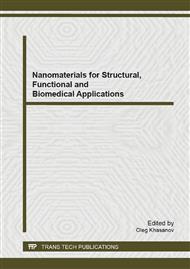[1]
M.L. Bershtein, V.A. Zaimovsky. Mechanical properties of metals. Hand-book, (1979).
Google Scholar
[2]
R. Zimmerman, K. Gunter, Metallurgy and Material Science. Hand-book. Transl. from German. M. 1 Metallurgy, (1982).
Google Scholar
[3]
Yu. I. Tyurin, A.I. Golovin, Non-dislocation plasticity and its role in mass transfer and dent formation by dynamic indentation. FTT 42 (2000) 1818-1820.
Google Scholar
[4]
R.A. Andrievsky, A.M. Glezer, Strength of nanostructures. Uspekhi fizicheskikh nauk 179 (2009) 337-358.
Google Scholar
[5]
V.E. Panin, V.P. Sergeyev, A.V. Panin, Yu I. Pochivalov. Nanostructurization of surface layers and application of nanostructure coatings as an effective method for hardening of modern construction and instrumental materials. FMM 104 (2007).
Google Scholar
[6]
S.N. Dub, N.V. Novikov, Nanohardness testing of solids. Superhard materials 6 (2004) 16-33.
Google Scholar
[7]
E.V. Kozlov, N.A. Koneva, N.A. Popova, Granular structure, geometrically necessary dislocations and secondary phase particles and polycrystals on the macro- and meso- scale levels. Physical Meso-Mechanics 12 (2009) 93-106.
DOI: 10.1016/j.physme.2009.12.010
Google Scholar
[8]
O.V. Kazmina, V.I. Vereshshagin, B.S. Semukhin, A.N. Abijaka, Low-temperature synthesis of granular glass from mixes based on silica-alumina containing components for obtaining foam materials. Glass and Ceramic 66 (2009) 314-344.
DOI: 10.1007/s10717-010-9193-8
Google Scholar
[9]
O.V. Kazmina, V.I. Vereshshagin, A.N. Abijaka, Expansion of the raw-materials source base for foam-glass-ceramic materials production. Building Materials 7 (2009) 54-56.
Google Scholar
[10]
P.D. Sarkisov, Production of multifunctional crystalline glass materials by directional cryslallization of glass. M: Mendeleyev PKhTU, (1997).
Google Scholar
[11]
N.P. Lyakishev, Nanocrystalline structures – a novel perspective of construction material development. Vestnik of Russian Academy of Sciences 73 (2003) 422.
Google Scholar
[12]
O.V. Kazmina, V.I. Vereshshagin, B.S. Semukhin, Structure and Strength of foam-glass-crystalline materials produced from a glass granulate. Glass Physics and Chemistry 37 (2011) 29-36.
DOI: 10.1134/s1087659611040092
Google Scholar
[13]
G.D. Chukin, Surface chemistry and disperse silica structure. M.: Paladin Publishing House, ООО «Printa», (2008).
Google Scholar
[14]
E.A. Golubev, Hypomolecular structures of natural-ray amorphous materials. Ekaterinburg: Publishing House of RAS (Urals Branch), (2006).
Google Scholar
[15]
E.A. Golubev, Scanning probe microscopy data on the globular structure of higher anthraxolites. Doklady Akademii Nauk 425 (2009) 519–521.
DOI: 10.1134/s1028334x09030179
Google Scholar
[16]
Ye. А. Golubev, Scanning Probe Microscopy in Researches of Micro- and Nanostructure in Noncrystalline Geomaterials. Microscopy & Microanalysis 9 (2003) 304-305.
DOI: 10.1017/s1431927603025029
Google Scholar
[17]
V.I. Beryozkin, Fullerenes as nuclei of soot particles. FTT 42 (2000) 567-572.
Google Scholar
[18]
W.H. Jiang, M. Atzmon, Acta Mater 51 (2003) 4095.
Google Scholar
[19]
H. Chen, Y. He, G.J. Shiflet, S.J. Poon Nature 367 (1994) 541.
Google Scholar
[20]
W.H. Jiang, M. Atzmon. Scripta Mater 54 (2006) 333.
Google Scholar
[21]
W.H. Jiang, F.E. Pinkerton, M. Atzmon. Appl Phys 93 (2003) 9287.
Google Scholar


